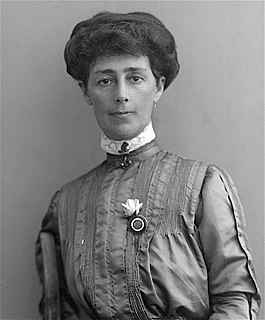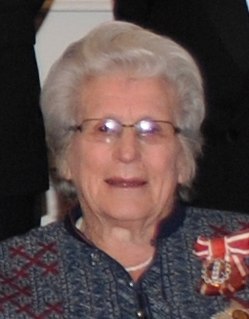
Katherine Wilson Sheppard was the most prominent member of the women's suffrage movement in New Zealand and the country's most famous suffragist. Born in Liverpool, England, she emigrated to New Zealand with her family in 1868. There she became an active member of various religious and social organisations, including the Women's Christian Temperance Union New Zealand. In 1887 she was appointed the WCTU NZ's National Superintendent for Franchise and Legislation, a position she used to advance the cause of women's suffrage in New Zealand.

Vida Jane Mary Goldstein was an Australian suffragist and social reformer. She was one of four female candidates at the 1903 federal election, the first at which women were eligible to stand.

Women's suffrage in New Zealand was an important political issue in the late nineteenth century. In early colonial New Zealand, as in European societies, women were excluded from any involvement in politics. Public opinion began to change in the latter half of the nineteenth century and after years of effort by women's suffrage campaigners, led by Kate Sheppard, New Zealand became the first nation in the world in which all women had the right to vote in parliamentary elections.

Dame Miriam Patricia Dell is a New Zealand women's advocate, botanist and former schoolteacher. She was the president of the National Council of Women of New Zealand from 1970 to 1974 and the first New Zealand president of the International Council of Women from 1979 to 1984. She established the Committee on Women, the forerunner to New Zealand's Ministry for Women. Her work on promoting women's rights and advancement led to her being appointed as a Member of the Order of New Zealand in 1993, New Zealand's highest civilian honour.
Dame Patricia Rose Bergquist was a New Zealand zoologist who specialised in anatomy and taxonomy. At the time of her death, she was professor emerita of zoology and honorary professor of anatomy with radiology at the University of Auckland.
Marilyn Lee Lake, is an Australian historian known for her work on the effects of the military and war on Australian civil society, the political history of Australian women and Australian racism including the White Australia Policy and the movement for Aboriginal and Torres Strait Islander human rights. She was awarded a Personal Chair in History at La Trobe University in 1994. She has been elected a Fellow, Australian Academy of the Humanities and a Fellow, Academy of the Social Sciences in Australia.
Professor Susan Margaret Magarey, is an Australian historian and author, most notable for her historic works and biographies of Australian women.

Women's suffrage in Australia was one of the earliest objectives of the movement for gender equality in Australia. It began to be socially and politically accepted and legislated during the late 19th century, beginning with South Australia in 1894 and Western Australia in 1899. In 1902, the newly established Australian Parliament passed the Commonwealth Franchise Act 1902, which set a uniform law enabling women to vote at federal elections and to stand for the federal parliament. This removed gender discrimination for white people in relation to electoral rights for federal elections in Australia. By 1908, the remaining Australian states had legislated for women's suffrage for state elections. It took longer before women could stand for parliament throughout Australia and even longer before they were actually elected.

Harriet Russell Morison was a New Zealand tailor, trade unionist, suffragist and public servant.

Women in Australia refers to women's demographic and cultural presence in Australia. Australian women have contributed greatly to the country's development, in many areas. Historically, a masculine bias has dominated Australian culture. Since 1984, the Sex Discrimination Act 1984 (Cth) has prohibited sex discrimination throughout Australia in a range of areas of public life, including work, accommodation, education, the provision of goods, facilities and services, the activities of clubs and the administration of Commonwealth laws and programs, though some residual inequalities still persist.
Gill (Gillian) Matthewson is a New Zealand architect, scholar and educator, based since 2016 at Monash University in Melbourne, Australia.
Sue Reidy is a New Zealand author and designer.
Melanie Claire Nolan is a historian and university academic from New Zealand, specialising in labour and gender history. She is the Director of the National Centre of Biography at the Australian National University, and General Editor of the Australian Dictionary of Biography.
Joy Damousi, is an Australian historian and Professor and Director of the Institute for Humanities and Social Sciences at Australian Catholic University. She was Professor of History in the School of Historical and Philosophical Studies at the University of Melbourne for most of her career, and retains a fractional appointment. She was the President of the Australian Academy of the Humanities.
Judith Ann Whitworth is an Australian medical researcher in the areas of kidney function and blood pressure. Now an Emeritus Professor, she is the former Director of the John Curtin School of Medical Research and Howard Florey Professor of Medical Research at the Australian National University (ANU).
Miriam Joyce Dixson is an Australian social historian and the author of The Real Matilda: Woman and Identity in Australia 1788 to 1975.
Susan Kathleen Foley is an Australian historian who specialises in French history, particularly in relation to French gender history, feminism and socialism. From 1992 to 2000, she published under her married name of Susan K. Grogan.
Patricia Marcia Crawford, was an Australian historian of women. She featured in a conference, London's Women Historians, held at the Institute of Historical Research in 2017.
Marian Quartly is an Australian social historian. She is professor emeritus in history at Monash University.
Ann Margaret McGrath is the WK Hancock Chair of History at the Australian National University. She is Director of the Research Centre for Deep History and Kathleen Fitzpatrick ARC Laureate Fellow 2017-22.






